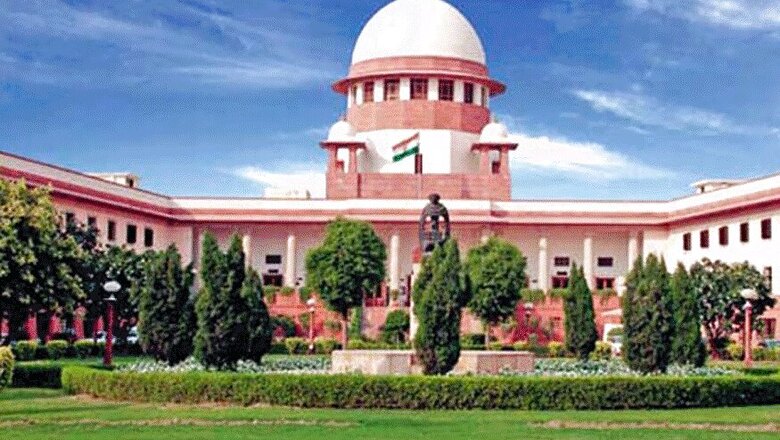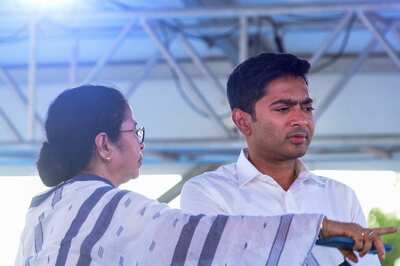
views
New Delhi: The Supreme Court on Tuesday made it clear that the ban on entry of women in the age group of 10-50 years into the Sabarimala temple would be tested on "constitutional ethos" and asked the temple board to establish that the restriction was an "essential and integral" part of religious faith.
A five judge Constitution bench headed by Chief Justice Dipak Misra was apparently not in agreement with the argument of the Travancore Devaswom Board running the over 800-year-old Lord Ayyappa temple that the "practice and belief" that have continued uninterrupted cannot be tested on the ground of "modern ethos".
"Not modern ethos, but constitutional ethos. Modern notions keep changing. After 1950 (when the Constitution came into being), everything should conform to constitutional principles and ethos," the bench, also comprising justices R F Nariman, A M Khanwilkar, D Y Chandrachud and Indu Malhotra, said.
The bench also told senior advocate A M Singhvi, representing the temple board, that it will have to establish that banning the entry of women was "essential and integral" part of the religious belief.
The court, hearing the plea of Indian Young Lawyers Association and others challenging the ban, referred to articles 25 and 26 (Freedom to practice religion) of the Constitution and said that a person can only be restrained on the grounds of "public health, public order and morality".
"Morality means constitutional morality. If the practice is essential and integral part of the religious practice then it should must be read in conjunction with fundamental rights of women," the bench said, adding that the temple board will have to show that "they are religious denomination indeed".
"Can the Supreme Court decide as to what is essential practice," Singhvi asked, adding that the core part of a Hindu religious sect cannot be unsettled by the court while entertaining a PIL.
"My belief may be fickle, irrational. There are sects of Shias who believe in self-flagellation. Many will call it barbaric, others will say it is religious. It is certainly not in consonance with 2018 notions, but it is still my belief," he said.
He also said that except in Dawoodi Bohra Muslim sect, no other sect allowed women inside a mosque across the country and testing these practices based on belief would open a "pandora's box".
At the outset, Singhvi referred to the history behind the temple and said that it has been an unique one and there has been belief that the women of the particular age group cannot observe he 41 days period of "austerity, penance and celibacy" as they are barred.
The bench pointed out the contradictions in the submissions made by the board before the Kerala High Court and said it was the accepted position that women of all age groups had been allowed entry during the first five days of the annual pilgrimage and after the entry was barred as the crowd used to swell.
"There cannot be a situation where the deity disappears for five days and suddenly re-appears after that," the bench said, adding that it has been never been said that since the women cannot maintain the purity, they were barred from entering the temple.
Singhvi said practice of permitting only very young and old women to the temple was there since "antiquity" and the court should not venture to disturb it without the petitioners producing any material to the ancient practice.
He also said the ban on the entry of women in the temple was not gender specific as it barred women of a particular age group and there was the notion of "purity" attached to it.
He also referred to the nature deity at the temple and said that the court should not enter into this arena.
Singhvi also said no temple in the country was open to the women during the days of menstruation and this practice is being voluntarily observed by them.
"In a patriarchal society, women are made to go through a certain social conditioning from birth. How to behave, what to say, what to do," the bench said.
It also said men, due to their "overwhelming dominant position" framed such norms that women cannot maintain purity for 41 days.
"The question is can a public temple enter into the concept of banning," the bench said.
"You say men go to the Sabarimala temple because their dominant status make them capable for austerity. But a woman, a chattel of man, cannot practice austerity. How can we accept this," the bench asked.
Women before puberty and after menopause are allowed into the Sabarimala and men regardless of the puberty or andropause can enter, the bench observed.
Singhvi said that it we look this practice from the angle of male dominance then "every religion is based on male chauvinism" and referred to instances from other religions where women are not treated at par with men.
He referred to the issue of 'dargah', mosques and some temples and said that at some places women are not allowed and some other places men are disallowed.
The advancing of arguments would resume tomorrow.
The Kerala government had supported the entry of women of all age groups into the temple.
The apex court had on October 13 last year referred the issue to a Constitution bench after framing five "significant" questions including whether the practice of banning entry of women of that particular age group into the temple amounted to discrimination and violated their fundamental rights under the Constitution.


















Comments
0 comment